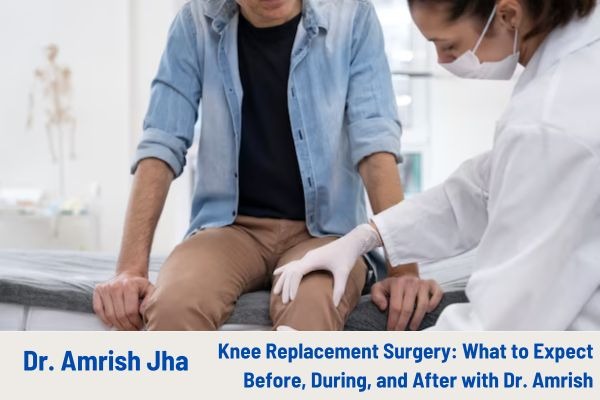Knee Replacement Surgery: What to Expect Before, During, and After with Dr. Amrish Kumar Jha
BMeta Description: Explore the knee replacement procedure with expert insights from Dr. Amrish Kumar Jha. Learn about what to expect before, during, and after surgery, including recovery tips. log post description.
Dr. Amrish Kumar Jha
5/6/20253 min read


Understanding the Knee Replacement Procedure: What to Expect Before, During, and After
Knee replacement surgery, also known as total knee arthroplasty (TKA), is a widely performed procedure for individuals suffering from severe knee pain, typically due to conditions like osteoarthritis, rheumatoid arthritis, or injury. If your knee pain has become chronic and limits your daily activities, knee replacement surgery could be the key to restoring your mobility and improving your quality of life.
In this blog, Dr. Amrish Kumar Jha, a leading orthopedic surgeon, provides detailed insights into what you can expect before, during, and after knee replacement surgery.
Before Knee Replacement Surgery: Essential Preparations
Proper preparation is crucial for the success of knee replacement surgery. Here’s what you can expect before the procedure:
1. Pre-Surgery Consultation
Your journey begins with a consultation with Dr. Amrish Kumar Jha, where he will:
Evaluate your knee condition: This includes physical exams and medical history reviews to assess the extent of knee damage.
Diagnostic tests: Expect X-rays and MRIs to understand the severity of joint degeneration.
Discuss your options: If non-surgical methods like physical therapy or medications haven't helped, knee replacement surgery may be recommended.
2. Preparing for Surgery
Once surgery is scheduled, you will receive specific instructions, such as:
Dietary restrictions: Fasting before surgery to reduce the risk of complications.
Medications: Adjusting any medications that might interfere with the surgery, especially blood thinners.
Prehabilitation exercises: Strengthening the muscles around the knee to help improve recovery after surgery.
During Knee Replacement Surgery: The Procedure Explained
Knee replacement surgery typically takes 1-2 hours and is performed under general anesthesia or spinal anesthesia. Here’s what happens during the procedure:
1. Removal of Damaged Tissue
The surgeon, Dr. Amrish Kumar Jha, will carefully remove the damaged portions of the knee joint, including parts of the femur (thigh bone), tibia (shin bone), and sometimes the patella (kneecap), depending on the level of damage.
2. Placement of the Prosthetic
A prosthetic knee joint, made of metal, plastic, and ceramic materials, will be fitted into the prepared knee joint. This prosthetic is designed to mimic the natural movement of your knee and alleviate pain caused by the damaged joint.
3. Closing the Incision
After the prosthetic is securely placed, the surgeon will close the incision with stitches or staples, and a bandage or dressing will be applied.
After Knee Replacement Surgery: Recovery and Rehabilitation
The recovery process is gradual, but with proper care, most patients experience significant improvements in knee function and pain relief. Here’s what to expect after the procedure:
1. Immediate Post-Surgery Care
You will typically stay in the hospital for 1-3 days. The initial phase includes:
Pain management: Pain medications will be administered to ensure comfort.
Physical therapy: Physical therapy may begin on the same day or the next day to help you move your knee and regain strength.
2. Rehabilitation and Physical Therapy
One of the most important aspects of recovery is physical therapy. Dr. Amrish Kumar Jha will guide you on exercises that help you:
Restore range of motion: The focus will be on bending and straightening your knee.
Strengthen muscles: Strengthening the muscles around the knee joint will provide stability and improve movement.
Gradual weight-bearing: As you heal, you will gradually begin to put weight on your new knee.
3. Home Care and Lifestyle Adjustments
Once you return home, you’ll need to follow Dr. Jha’s post-surgery instructions, which may include:
Managing swelling: Elevating your leg and applying ice can help reduce swelling.
Wound care: Keep the incision clean and dry to prevent infection.
Activity restrictions: Avoid high-impact activities for the first few months as your knee heals.
Potential Risks and Complications
As with any major surgery, knee replacement comes with certain risks. Dr. Amrish Kumar Jha will take every measure to minimize them, but potential complications include:
Infection at the surgical site
Blood clots in the legs or lungs
Prosthetic failure over time
Long-Term Outlook: What to Expect After Recovery
Full recovery from knee replacement surgery can take 6-12 months, although you may notice significant pain relief and improved mobility within the first few months. Most patients can return to normal activities like walking, climbing stairs, and driving after 3-6 months.
The prosthetic joint typically lasts 15-20 years, depending on the level of physical activity and lifestyle.
Conclusion
Knee replacement surgery is a life-changing procedure that can significantly improve your quality of life by relieving chronic pain and restoring mobility. Under the expert guidance of Dr. Amrish Kumar Jha, you can expect a comprehensive approach to both your surgery and recovery process, ensuring the best possible outcome.
If you're experiencing knee pain and limited movement, don't hesitate to consult Dr. Amrish Kumar Jha for personalized advice and to discuss whether knee replacement surgery is right for you.
